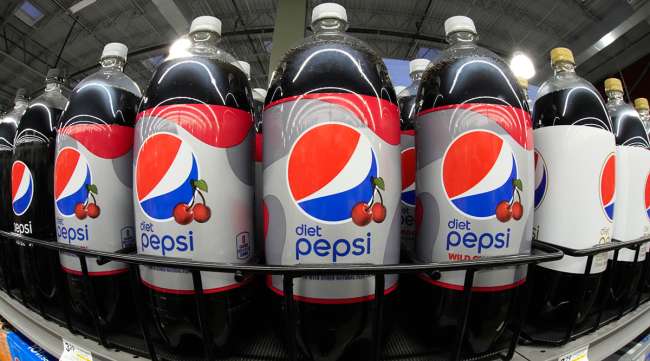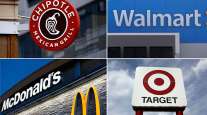Associated Press
FTC Accuses PepsiCo of Price Discrimination Favoring Walmart

[Stay on top of transportation news: Get TTNews in your inbox.]
The Federal Trade Commission sued PepsiCo on Jan. 17, alleging that it has engaged in illegal price discrimination by giving unfair price advantages to one large retailer at the expense of other vendors and consumers.
The benefiting customer wasn’t named in an FTC statement about the lawsuit. But a source familiar with the case, who asked not to be named because they were not authorized to discuss it, said the retailer was Walmart.
PepsiCo said the lawsuit “is wrong on the facts and the law” and misunderstands the way consumer product companies help retailers provide lower prices.
“PepsiCo strongly disputes the FTC’s allegations and the partisan manner in which the suit was filed. We will vigorously present our case in court,” the company said in a statement.
Walmart and PepsiCo rank Nos. 1 and 2, respectively, on the Transport Topics Top 100 list of the largest private carriers in North America. Walmart passed PepsiCo for the top spot in 2024. PepsiCo had ranked No. 1 since 2010.
The FTC said PepsiCo’s practices included making promotional payments to Walmart but not to large grocery chains or independent convenience stores. The FTC said that lets Walmart lower its prices but forces Americans to pay inflated prices for PepsiCo products unless they shop at Walmart.

Khan
“When firms like Pepsi give massive retailers a leg up, it tilts the playing field against small firms and ultimately inflates prices for American consumers,” FTC Chair Lina Khan said in the statement. “The FTC’s action will help ensure all grocers and other businesses — no matter the size — can get a fair shake and compete on the merits of their skill, efficiency and talent.”
Walmart said Jan. 17 that it had “nothing to add at this time.” PepsiCo said its practices “are in line with industry norms.”
“We do not favor certain customers by offering discounts or promotional support to some customers and not others,” the company said.
The FTC sued PepsiCo under the rarely enforced 1936 Robinson-Patman Act. The FTC said the act prohibits companies from using promotional incentive payments to favor large customers over smaller ones.
Truck Parking Club's Evan Shelley discusses how innovative platforms are turning available space into opportunities for reserved parking. Tune in above or by going to RoadSigns.ttnews.com.
It was the second time in a little more than a month that the FTC has cited the Robinson-Patman Act in a lawsuit. In December, the commission sued Southern Glazer’s Wine & Spirits, a large U.S. distributor that ranks No. 49 on the private TT100, saying it illegally discriminated against small and independent businesses by giving discounts and rebates to larger stores.
In the waning days of the Biden administration, the FTC has been busy issuing consumer refunds, taking enforcement actions against companies the agency accuses of deceptive practices and finalizing rules it says are needed to make the marketplace more fair.
The FTC voted 3-2 to authorize staff to file a lawsuit for a permanent injunction against PepsiCo in the U.S. District Court for the Southern District of New York. Commissioner Andrew Ferguson, who is President-elect Donald Trump’s choice to replace Khan, was one of the two dissenting votes.
The other commissioner voting against the lawsuit, Melissa Holyoak, wrote in her dissent that the case against PepsiCo was “the worst case I have seen in my time at the commission.” Holyoak said the majority of commissioners rushed the case out the door before they had enough evidence to support the allegations.
“Pepsi’s promotions to the retailer are not disguised discriminatory discounts but rather ordinary price concessions,” Holyoak wrote.
PepsiCo, based in Purchase, N.Y., is one of the world’s largest food companies. It makes Pepsi, Mountain Dew and Gatorade as well as snack foods like Lay’s potato chips, Doritos and Fritos. It also makes Quaker Oats, breakfast cereals and granola bars.
Want more news? Listen to today's daily briefing above or go here for more info
PepsiCo’s prices have been the subject of some scrutiny since the pandemic. In 2022, for example, the company acknowledged shrinking its Gatorade bottles from 32 ounces to 28 ounces, but it didn’t respond when asked why it charged more for the 28-ounce bottles.
In October, Democratic Sen. Elizabeth Warren of Massachusetts and U.S. Rep. Madeleine Dean of Pennsylvania sent letters to PepsiCo, Coca-Cola and General Mills accusing them of price gouging through shrinking package sizes.
PepsiCo has said its price increases were necessary because of the rising cost of ingredients, shipping, packaging and labor. But over the summer, the company said consumers were pulling back on snack and drink purchases or shifting to cheaper store brands.





